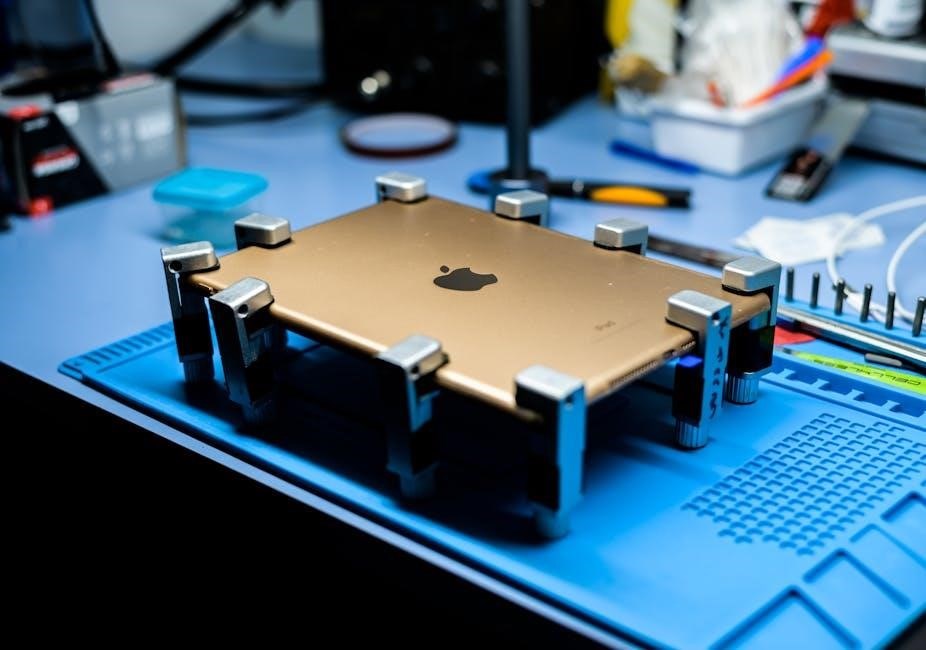
Service desk technical interviews assess candidates’ problem-solving skills, technical knowledge, and customer service abilities. They help employers identify individuals who can effectively troubleshoot and resolve user issues.
Overview of Service Desk Roles
Service desk roles involve providing technical support and assistance to users, ensuring smooth operation of systems and resolving issues efficiently. Professionals in this field manage ticketing systems, troubleshoot hardware and software problems, and offer customer service. Key responsibilities include diagnosing network issues, assisting with operating systems, and maintaining documentation. They also collaborate with IT teams to address complex technical challenges. Strong communication skills, patience, and adaptability are essential for success in this role. Service desk specialists must stay updated on the latest technologies and tools, such as ServiceNow or Zendesk, to handle diverse user queries effectively. Their work directly impacts user satisfaction and organizational productivity, making them crucial in maintaining IT infrastructure and user confidence.
Importance of Technical Interviews in Service Desk Hiring
Technical interviews are crucial for identifying candidates with the necessary skills to excel in service desk roles. They allow employers to assess problem-solving abilities, technical knowledge, and hands-on experience. By simulating real-world scenarios, interviews help evaluate how candidates troubleshoot hardware, software, and network issues. This process ensures that only those who can handle the demands of the job are selected. Additionally, interviews provide insights into a candidate’s communication skills, which are vital for customer interaction. Employers also gauge adaptability and willingness to learn, ensuring the candidate can keep up with evolving technologies. Ultimately, technical interviews bridge the gap between resumes and practical capabilities, making them indispensable in service desk hiring processes. They ensure that new hires are well-equipped to meet user needs effectively.

Common Service Desk Interview Questions
Service desk interviews often include a mix of general, behavioral, and technical questions. These inquiries assess problem-solving skills, customer service abilities, and technical expertise. Candidates should prepare for scenarios that evaluate their troubleshooting techniques and experience with ticketing systems. Additionally, questions about adaptability, time management, and teamwork are frequently asked. Understanding hardware, software, and networking fundamentals is also essential. Employers seek individuals who can communicate complex solutions clearly and remain patient under pressure. Practicing common questions and reviewing technical documentation can significantly improve performance. Demonstrating a strong foundation in IT principles and customer support strategies is key to success.
General Service Desk Interview Questions

General service desk interview questions focus on assessing a candidate’s self-awareness, communication skills, and overall suitability for the role. Common inquiries include asking about key strengths and weaknesses, as well as experiences working in customer-facing environments. Employers often seek examples of how candidates have handled difficult situations or improved processes in previous roles. Additionally, questions about familiarity with ticketing systems, operating systems, and common software applications are frequently asked. Candidates are also encouraged to discuss their problem-solving approaches and how they ensure customer satisfaction. These questions help employers evaluate a candidate’s ability to adapt to the service desk environment and provide effective support. Preparation for these inquiries involves reviewing past experiences and practicing clear, concise responses.
Behavioral Service Desk Interview Questions
Behavioral questions in service desk interviews focus on evaluating a candidate’s interpersonal skills, problem-solving abilities, and adaptability in real-life scenarios. Common examples include inquiries about teamwork, such as “Describe a time you collaborated with others to resolve an issue,” and problem-solving scenarios, like “Tell me about a difficult customer you dealt with and how you handled it.” Employers also ask about time management and organization, such as “How do you prioritize tasks when handling multiple requests?” These questions aim to assess how candidates handle stress, communicate effectively, and maintain customer satisfaction. By sharing specific examples from past experiences, candidates demonstrate their ability to thrive in a dynamic service desk environment. Preparation involves reflecting on personal experiences and practicing clear, structured responses.
Technical Service Desk Interview Questions
Technical service desk interviews include questions that assess a candidate’s ability to diagnose and resolve hardware, software, and networking issues. Examples include inquiries about identifying faulty components in a computer, troubleshooting network connectivity problems, or explaining the function of BIOS. Employers may also ask about operating systems, such as “How do you resolve a Windows boot issue?” or “What steps would you take to address a macOS update failure?” Additionally, questions about cloud computing basics, cybersecurity awareness, and common software applications are common. These questions aim to evaluate the candidate’s technical proficiency and problem-solving skills. Preparing for these requires a strong understanding of IT fundamentals and hands-on experience with troubleshooting tools and techniques.

Technical Questions for Service Desk Interviews
These questions focus on hardware, software, networking fundamentals, BIOS, operating systems, and troubleshooting techniques to assess technical proficiency and problem-solving skills.
Hardware-Related Questions
Hardware-related questions assess knowledge of computer components, troubleshooting, and maintenance. Common topics include identifying the latest CPU models, understanding USB functionality, and explaining hardware components like RAM, GPUs, and motherboards. Interviewers may ask about diagnosing hardware failures, such as faulty hard drives or power supply issues. Candidates are often queried on troubleshooting steps for common hardware problems, like no boot scenarios or peripheral connectivity issues. These questions evaluate technical expertise and the ability to resolve hardware-related incidents efficiently. Familiarity with tools like screwdrivers, multimeters, and diagnostic software is also frequently tested. The goal is to ensure candidates can handle hardware challenges effectively, aligning with the service desk role’s requirements.
Software-Related Questions
Software-related questions evaluate a candidate’s understanding of operating systems, applications, and troubleshooting techniques. Common topics include installing, configuring, and troubleshooting software applications. Interviewers may ask about resolving issues like application crashes, compatibility problems, or software installation errors. Knowledge of operating systems, such as Windows, macOS, or Linux, is frequently assessed. Candidates may be queried on diagnosing software conflicts, managing updates, or restoring system settings. These questions test problem-solving skills and familiarity with software tools. Understanding of ticketing systems like ServiceNow or Zendesk is also often explored. The goal is to ensure candidates can efficiently address software-related issues, aligning with the service desk role’s demands for technical proficiency and customer support excellence.
Networking Fundamentals Questions
Networking fundamentals questions test a candidate’s understanding of basic network concepts and troubleshooting techniques. Common topics include IP addressing, DNS, DHCP, and network topologies. Interviewers may ask about diagnosing connectivity issues, such as identifying why a device can’t connect to a network. Candidates may be queried on understanding firewalls, routers, and switches, as well as common network protocols like HTTP, FTP, and TCP/IP. Troubleshooting scenarios, like resolving Wi-Fi connectivity problems or identifying bottlenecks, are often discussed. These questions assess the ability to apply networking knowledge to real-world service desk challenges. Proficiency in network troubleshooting is essential for resolving user connectivity issues efficiently and effectively, ensuring minimal downtime and optimal service delivery.
Troubleshooting Techniques
Troubleshooting techniques are essential for service desk roles, as they involve diagnosing and resolving technical issues efficiently. Common questions revolve around identifying symptoms, isolating problems, and applying systematic solutions. Candidates may be asked to describe their approach to resolving hardware or software malfunctions, such as identifying root causes or restoring services. Interviewers often present real-world scenarios, like a user unable to access email or print documents, to assess problem-solving skills. Knowledge of diagnostic tools and methodologies, such as structured troubleshooting or ITIL best practices, is frequently evaluated. Effective communication during troubleshooting, like explaining solutions to non-technical users, is also a key area of focus. These questions help employers gauge a candidate’s ability to handle diverse technical challenges and deliver timely resolutions.
Operating System Queries

Operating system queries are fundamental in service desk interviews, as they test a candidate’s ability to manage and troubleshoot common OS-related issues. Interviewers often ask about installation, configuration, and system updates, as well as troubleshooting techniques for errors like boot failures or driver conflicts. Candidates may be quizzed on differences between operating systems, such as Windows, macOS, or Linux, and their respective features. Questions about user account management, permissions, and system security are also common. Employers seek to understand how well candidates can resolve issues like slow performance or compatibility problems. Demonstrating hands-on experience and practical knowledge of OS functionalities is crucial for success in these interviews.
Cloud Computing Basics
Cloud computing basics are essential topics in service desk interviews, as organizations increasingly rely on cloud services. Candidates are often asked about fundamental concepts like IaaS, PaaS, and SaaS, as well as cloud providers such as AWS, Azure, or Google Cloud. Interviewers may inquire about cloud storage solutions, virtual machines, and migration processes. Understanding of security practices, data backup strategies, and disaster recovery in cloud environments is also crucial. Questions may cover troubleshooting cloud-related issues, such as connectivity problems or service interruptions. Demonstrating familiarity with cloud platforms and their management consoles can highlight a candidate’s ability to support users effectively in a cloud-driven ecosystem. This knowledge is vital for service desk roles, ensuring seamless support for cloud-based services.

Cybersecurity Awareness
Cybersecurity awareness is a critical component of service desk roles, as technicians often handle sensitive data and systems. Interview questions may focus on identifying phishing attacks, understanding password policies, and recognizing common security threats. Candidates should be familiar with firewall configurations, antivirus software, and data protection practices. Knowledge of encryption methods and secure access controls is also essential. Additionally, questions may cover incident response procedures, such as isolating infected systems or reporting breaches. Understanding compliance frameworks like GDPR or HIPAA can demonstrate a deeper awareness of security best practices. being able to explain these concepts clearly shows a candidate’s ability to support secure environments effectively. This expertise is vital for maintaining organizational security and trust.

Behavioral Questions for Service Desk Interviews
Behavioral questions assess teamwork, problem-solving, customer interactions, time management, and adaptability. Candidates are evaluated on past experiences, conflict resolution, and stress handling in dynamic environments.
Teamwork and Collaboration
Teamwork and collaboration are critical in service desk roles, as resolving technical issues often requires collective effort. Employers look for candidates who can communicate effectively, share knowledge, and work harmoniously with colleagues.
Interviewers may ask about experiences where collaboration led to successful problem-solving or how candidates handled disagreements within a team. Demonstrating a positive attitude and willingness to support others highlights strong teamwork skills.
Candidates should emphasize their ability to contribute to a cohesive group environment and explain how they foster cooperation to achieve common goals. This showcases their readiness to thrive in a collaborative service desk setting.
Problem-Solving Scenarios
Problem-solving scenarios are essential in service desk interviews to evaluate a candidate’s ability to handle real-world technical challenges. Employers often present hypothetical situations, such as resolving a network outage or addressing a user’s software issue, to assess critical thinking and practical skills.
Candidates are expected to demonstrate a clear, logical approach to diagnosing and resolving problems. For example, they might be asked to describe how they would troubleshoot a common hardware or software issue.
Highlighting past experiences where they successfully resolved complex technical problems can showcase their problem-solving abilities. The goal is to illustrate patience, analytical skills, and the ability to communicate solutions effectively to users.
Customer Service Skills
Customer service skills are crucial for service desk roles, as they directly impact user satisfaction and organizational success. Interviewers often ask scenario-based questions to assess a candidate’s ability to remain patient, empathetic, and professional when dealing with frustrated or confused users.
Candidates are expected to demonstrate effective communication, conflict resolution, and problem-solving abilities. For example, they might be asked to describe how they would handle a difficult customer or explain a technical issue in simple terms.
Highlighting experiences where they provided exceptional support and ensured positive outcomes can showcase their customer service expertise. Employers seek individuals who can balance technical competence with a genuine focus on user needs and satisfaction.
Time Management and Organization
Time management and organization are essential skills for service desk professionals, as they often handle multiple tasks and deadlines simultaneously. Interviewers may ask questions like, “How do you prioritize tasks when managing multiple tickets?” or “Describe a situation where you had to meet a tight deadline.”
Candidates should demonstrate their ability to organize workflows, manage competing priorities, and maintain productivity. Highlighting tools or techniques they use, such as calendars, task lists, or time-blocking, can illustrate their organizational skills.
Employers seek individuals who can efficiently manage their time while maintaining attention to detail and delivering results. Showcasing how you handle interruptions or unexpected tasks can further emphasize your organizational abilities. This skill set ensures smooth operations and high customer satisfaction in a fast-paced service desk environment.
Adaptability and Flexibility
Adaptability and flexibility are critical for service desk roles, as professionals often encounter unexpected challenges and shifting priorities. Interviewers may ask, “How do you handle sudden changes in workload or unexpected technical issues?”
Candidates should demonstrate their ability to pivot quickly, remain calm under pressure, and adapt to new tools or processes. Examples of past experiences, such as transitioning between systems or learning new software, can highlight flexibility.
Employers value individuals who can thrive in dynamic environments and adjust their approach as needed. Showcasing how you remain productive during organizational changes or technical disruptions can underscore your adaptability. This skill ensures seamless operations and effective problem-solving in a fast-paced service desk setting.
Preparing for Service Desk Technical Interviews
Effective preparation involves researching the company, practicing common answers, and reviewing technical documentation. Simulating interview scenarios enhances confidence and readiness for real interactions.

Researching the Company
Researching the company is a critical step in preparing for service desk technical interviews. Understanding the organization’s products, services, and culture helps align your answers with their values. Review the company’s website, mission statement, and recent news to gain insights. Familiarize yourself with their ticketing systems, software, and hardware they support. This knowledge demonstrates your interest and readiness to contribute. Additionally, understanding their customer base and common technical challenges can help tailor your responses. Thorough preparation shows professionalism and enthusiasm, making a positive impression during the interview. It also enables you to ask informed questions, showcasing your proactive approach. This step is essential for standing out as a well-prepared candidate.
Practicing Common Answers
Practicing common answers is essential for acing service desk technical interviews. Review frequently asked questions and organize your thoughts into clear, concise responses. Use the STAR method (Situation, Task, Action, Result) to structure your answers, ensuring you highlight your problem-solving skills and technical expertise. Focus on showcasing your customer service abilities, adaptability, and knowledge of troubleshooting techniques. Practice discussing your experience with ticketing systems, operating systems, and common software applications. Tailor your answers to reflect real-world scenarios, demonstrating how you handle difficult customers or complex technical issues. Regular practice builds confidence and helps you deliver polished responses during the interview. This preparation ensures you present yourself as a capable and professional candidate.

Reviewing Technical Documentation
Reviewing technical documentation is a crucial step in preparing for service desk interviews. Familiarize yourself with manuals, guides, and troubleshooting resources related to common software and hardware. Understanding operating systems like Windows and macOS, as well as networking fundamentals, is vital. Study documentation on ticketing systems such as ServiceNow or Zendesk, as these are frequently discussed in interviews. Pay attention to cybersecurity best practices and cloud computing basics, as these topics are increasingly relevant. By thoroughly reviewing technical materials, you can confidently answer detailed questions and demonstrate your ability to resolve complex issues. This preparation not only enhances your knowledge but also shows your commitment to staying updated with industry standards and technologies. Regular review helps reinforce your understanding and ensures you are well-prepared for technical discussions.
Simulating Interview Scenarios
Simulating interview scenarios is an effective way to build confidence and improve your performance in service desk technical interviews. Practice common questions, technical challenges, and behavioral scenarios with a friend or mentor. Role-play as both the interviewer and the candidate to gain a deeper understanding of the process. Use online platforms or tools to mimic real interview environments, focusing on clarity and professionalism in your responses. Reviewing sample answers and practicing articulation will help you deliver concise and impactful replies. Simulating interviews also allows you to refine your problem-solving approach and demonstrate your technical expertise. Regular practice ensures you are prepared for a wide range of questions, from troubleshooting techniques to customer service skills. This method helps reduce nerves and enhances your ability to think critically under pressure.
Additional Resources for Service Desk Interviews
Explore recommended books, online courses, and practice platforms to enhance your preparation for service desk interviews. These resources provide valuable insights and practical exercises.
Recommended Reading Materials

For effective preparation, consider reading “IT Help Desk Support Specialist Interview Questions” and “Service Desk Interview Questions and Answers.” These guides provide insights into common and technical queries, helping you understand industry standards and improve problem-solving skills. Additionally, “CCNP Job Interview Questions & Answers” offers advanced technical knowledge. Books like “The Help Desk Handbook” and “Technical Support Essentials” are also valuable, covering troubleshooting techniques and customer service best practices. Online resources, such as blogs and PDF guides, offer practical tips and real-world scenarios. These materials ensure you are well-prepared for both behavioral and technical aspects of service desk interviews, enhancing your confidence and readiness.
Online Courses and Tutorials
Online courses are an excellent way to prepare for service desk technical interviews. Platforms like Udemy, Coursera, and LinkedIn Learning offer courses such as “IT Help Desk Support Specialist Interview Questions” and “Technical Support Essentials.” These courses cover technical skills, troubleshooting techniques, and customer service best practices. Additionally, tutorials like “Service Desk Analyst Training” provide hands-on experience with ticketing systems and common software tools. Many courses include practice labs and real-world scenarios to enhance learning. By enrolling in these programs, candidates can gain a deeper understanding of the role and improve their chances of success in interviews. These resources are particularly useful for freshers or those transitioning into the field, offering structured guidance and practical insights.
Practice Platforms and Tools
Practice platforms and tools are invaluable for honing skills and confidence before service desk technical interviews. Websites like InterviewBit, LeetCode, and HackerRank offer exercises to improve problem-solving and technical abilities. Tools such as Trello or Asana simulate task management scenarios, helping candidates practice organization and prioritization. Additionally, platforms like Pramp provide free interview simulations, allowing candidates to practice responding to common service desk questions in real-time. Some tools, like ServiceNow or Zendesk sandboxes, enable hands-on experience with ticketing systems. These resources help candidates familiarize themselves with industry-standard tools and refine their troubleshooting techniques. Regular practice on these platforms ensures readiness for both technical and behavioral aspects of service desk interviews, boosting overall performance.
Preparation is key to excelling in service desk technical interviews. By understanding common questions, practicing technical scenarios, and honing soft skills, candidates can confidently showcase their abilities. Researching the company and reviewing technical documentation also plays a crucial role in making a strong impression. Utilizing practice platforms and tools helps refine problem-solving and organizational skills, ensuring readiness for real-world challenges. A well-prepared candidate not only demonstrates technical expertise but also highlights their customer service and adaptability skills. With dedication and thorough preparation, aspiring service desk professionals can successfully navigate the interview process and secure their desired roles. Remember, confidence and practical knowledge are the cornerstones of a successful service desk interview.





